Fees & Funding
The Government has announced that from 2019/20 EU nationals will continue to be eligible for home fee status for undergraduate, postgraduate and advanced learner financial support from Student Finance England for the full duration of their course as per current rules. Sam Gyimah said:
- “EU students, staff and researchers make an important contribution to our universities. I want that contribution to continue and am confident – given the quality of our HE sector – that it will.”
UK (home) student fees will remain frozen at £9,250 (full time) and £6,935 (part time) for 2019/20. The maximum fees for accelerated courses have not yet been confirmed. The student loan repayment threshold will remain at £25,000. These arrangements will be laid before Parliament for confirmation in early 2019.
Meanwhile the post-18 education and funding review continues. Jane attended the Wonkhe “Proceed with Caution” event on Tuesday, and it was a lively and stimulating affair, as you will have seen if you follow @policyBU on Twitter (if you don’t, try it, we won’t sulk if you later unfollow us).
Wonkhe were live blogging during the day and you can read it here. They have all the links to the materials referenced.
The first part of the day focussed on data and context for the discussion about fees.
- Anna Vignoles, one of the authors of the infamous IFS report on LEO graduate earnings data that we reported on a few weeks ago, talked about what the research showed and why it was important. Anna acknowledged that the data told us something about government subsidy, might be useful to [some] students, and then more controversially, might highlight where programmes could be developed to improve employability. It does not tell us anything about current course quality [please take note, politicians and media commentators]. Anna also pointed out that, as the data was adjusted for prior attainment, and showed socio-economic gaps in earnings after graduation means that the expansion of HE has not consistently supported social mobility.
Our thoughts: importantly on the subsidy point, there are other relevant issues – the government may decide to subsidise courses because they do, or they don’t, on average increase earnings – but they may also decide to do so because they meet a societal or economic need. Or they might subsidise people not courses – ie choose who to subsidise not what. Or they might of course choose which institutions to subsidise – as they do for research.
- Andrew McGettigan gave a brilliantly clear exposition of the current accounting position for student loans and the perverse incentives for government that it creates, by hiding the true impact of the loan system on the economy – the “fiscal illusion”. To quote Wonkhe: “Accounting conventions make it look like our loan system creates a surplus – flattering the headline deficit figures. In reality, it does not. And the terms of reference of the post-18 review precludes any modification of this practice”.
This is going to change, because the Office for National Statistics are undertaking a review, after being told off by their EU counterpart. His main message is that this needs to be sorted out, because accounting should not drive policy – but he pointed out that an accounting change is more likely to leave the government with less, not more, money to spend on implementing the outcomes of the HE review. That change to the repayment threshold earlier this year suddenly looks even more like a strange way to prioritise government spending on HE.
- In one of the most through provoking sessions of the day, London Economics presented a model and then moved swiftly on to some options for the HE review. Their slides are here and are well worth a look. The recommendations are controversial – some of this was prompted by the Diamond review of funding in Wales.
- Up next was Philip Augar, Chair of the independent advisory panel to the review. He didn’t give much away – positively declining to answer two questions and ducking or giving very general answers to many. Some potential leads:
- He is very focused on simplifying the system so everyone can understand it. Or maybe improving the way it is explained so everyone can understand it. The first would require some major change. The second less so, it would be more about labels (graduate contribution not a loan)
- He mentioned employers a lot. Might there be an apprenticeship levy type contribution for degrees? He did talk about skills shortages and graduates doing non-graduate jobs, and referred to strengths – and weaknesses – in the sector, but refused to be drawn on the latter.
What is most interesting is what he described as his remit – to come up with some interesting options for the government to pick from. They will be practical, realistic and simple and build on existing initiatives. And may be ignore by a government that in March will be stuck with the outcome of the ONS review and dealing with Brexit? The BBC review of the speech is here. There’s another twitter thread from Rosemary Bennett of the BBC here
- Later sessions focussed on a discussion about value for money – most of which has been well rehearsed in other contexts, but there was a good level of debate and some interesting points. Amongst them were the point that the government is with one hand telling students not to worry about student debt (because it is income contingent) and on the other hand raising concerns about responsible lending. The squeeze on living costs and cap on maintenance loans is driving students to take out other loans for sums or to work too many hours. The focus in the public debate on debt and interest, and on tuition fees, is unhelpful. Living costs are the real practical day to day challenge for students – which is why most of the panellists agreed that maintenance grants should be a priority
It does feel as there is a perfect storm coming – and while the timing might suggest that this review is headed for the filing cabinet, the costs involved will mean that something will have to be done.
Immigration – borders open for science
Sam Gyimah spoke at a science park opening on Thursday to announce a relaxation of the immigration regulations which will allow an influx of scientific talent to the UK. Gyimah stated
- “it was only the first step towards a liberalisation of visa restrictions on scientific talent amid concerns that Brexit could damage the UK’s ability to attract bright academics from overseas.”
The Government coverage of the speech states the relaxation is Britain’s new unique selling point and aims to establish Britain as the ‘go-to place for science and innovation’.
The new scheme will allow non-EEA researchers, scientists and academics to reside in the UK for up to two years. It forms a new element within the Tier 5 (Government authorised exchange temporary worker) visa route. UKRI and 12 other approved research organizations (including Natural History Museum) have the ability to directly sponsor individuals to train and work in the UK.
Immigration Minister Caroline Nokes, stated:
- “I recognise the crucial contribution science makes to the UK economy and society and I am determined that the UK will continue to welcome leading scientific and research talent from around the world…We must have an immigration system that makes sure we can attract leading international talent and benefit from their knowledge and expertise.”
The Department for Business, Energy and Industrial Strategy (BEIS) will monitor this new scheme with UKRI regularly to ensure it meets the criteria for a Tier 5 scheme.
In his speech Gyimah stated:
- “we…face a longer-term question: what should our post-Brexit economy look like? And we cannot wait till the Brexit deal is done to answer it… With the City less profitable today than it once was, and North Sea output naturally declining, the search is on for the next wave of world-leading British businesses… We need new sources of growth, and a vision of how to succeed. And we need to set a direction that will sustain us not just for the next 9 months, but for the next 30 years…The businesses of the future will be based on science, research and technology. The world is changing, and the UK needs to take advantage of this… To tackle the grand challenges our society faces, and to move up the economic league table, we need to double down on our strengths in science, technology and innovation.
- This is partly a matter of investment. A decade ago, they idea that government investment had a role to play in fostering innovation was contentious, even controversial… investment is about much more than just public money. For every pound of public R&D in the UK, business contributes 2. And it takes more than R&D to build successful businesses. That’s why we are also working hard to create the conditions for greater long term private investment.
- Now is the right time to ask ourselves some big questions when it comes to our public R&D investment. How can we do more to ensure our investment crowds in private money? Have we struck the right balance between funding for basic and applied research?
- We should be proud that so many of the best and brightest from other countries choose to bring their knowledge and skills to Britain, and we should recognise that our economy is stronger for it. I don’t believe that the vote for Brexit was a vote for the UK to close ourselves off from the world.
- We also need to make the most of our openness to ideas. We should learn from the sharp-eyed heroes of the Industrial Revolution and think not just how we commercialise our own technology, but what we can learn and borrow from the best research around the world.”
Gyimah went on:
- “It is also time to ensure our institutions are playing the most effective role they backing innovation…Our universities are an intrinsic part of our innovation economy. Our best universities are not just powerhouses of research – they are also deeply connected to their local and national businesses, and to their community. There is an important geographical angle to consider. It is no surprise that many of the UK’s most successful publicly funded labs and institutions are in the Oxford-Cambridge-London triangle, because we rightly fund research on the basis of excellence and not political patronage, and one corollary of that is that the most successful universities have consistently punched above their weight in winning further research funding. But it is important that we recognise that, when it comes to innovation, there is life outside the Golden Triangle. Indeed, sometimes the private sector seems quicker to realise it than public research funders.
- I want to see to N8 Alliance of Northern Universities become powerhouses of economic growth in their area, and to ensure we back innovation wherever it may be… But universities are not the only institutions that are can drive innovation. We should also consider how our regulatory systems can encourage innovation, by making sure that our rules keep up with the pace of technology and business change.”
Gyimah went on to:
- Launch the new £10 million Regulators’ Pioneer Fund, as an integral part of the Industrial Strategy. The fund will invest in initiatives to support businesses that are bringing innovative products to market
- Announce the Government Office for Science will work with UKRI and the Better Regulation Executive to develop standards for new technologies and their applications (to build on work for self-driving car testbeds).
- State: “We need to consider whether we have struck the right balance between encouraging spin-outs and maximising university revenues.”
He concluded by stating: “By drawing on our national strengths of openness, entrepreneurship and strong institutions, we can make the UK a true platform for innovation. This in turn will help establish the UK’s place in the world, and our future prosperity.”
Gyimah’s speech was covered in The Times: UK opens door to gifted foreign scientists.
Mature students and cold spots
UCAS published a report into admissions patterns for mature applicants: Full report
“Research published by UCAS shows that mature students are more likely to apply to universities and colleges close to home, primarily for a limited selection of vocational subjects, and when there are fewer jobs available. Our analysis also shows significant regional variations in entry rates to full-time higher education among mature students, and these differ notably from the patterns in entry to university among applicants of different age groups.
The report Admissions patterns for mature applicants (5.37 MB) compares the characteristics within groups of mature students aged 21 and over, to those aged 18, applying for full-time undergraduate courses. The key findings are as follows:
- Living at home – mature students are more likely to live at home while studying full-time, and this likelihood increases with age. Half of 21 to 25 year olds live at home while studying, compared to nearly 80% of those aged 30 and over. In comparison, 18 year olds are more likely to attend a university over an hour away from their home, with over 50% having a drive time of 70 minutes or more.
- Vocational subject choices – mature students are typically drawn to a small range of courses, with subjects allied to medicine (including nursing), education, and social studies the most popular. As more female students typically apply for these courses, this may explain why more than 70% of mature students over the age of 31, accepted to full-time degrees, are female.
- Entry rates by region – in 2017, for mature students aged 21 to 50, entry rates to higher education by UK country and region are highest in Scotland, followed by London. However, due to differences in age distribution across the regions, entry rates vary by region for different age groups of mature applicants, with London having the highest entry rates for those aged 36 to 50.
- Applications are higher when the job market is weaker – there appears to be a relationship between applications and the number of job vacancies. When the number of UK employment opportunities was at its lowest, between 2009 and 2011, application rates for full-time undergraduate courses from mature students peaked. Since 2015, the number of job vacancies has increased, while application rates for full-time study have declined. This suggests mature students look to the employment market when jobs are plentiful, and apply to higher education when jobs are sparse.”
Clare Marchant, UCAS’ Chief Executive, said:
- ‘Mature students have different motivations, expectations, and needs compared to their younger counterparts. Entering full-time higher education as an older student is a life-changing commitment, reflected in the focused choices many older students make to pursue highly vocational subjects.”
This was written up on Wonkhe by David Kernohan, and reported in the Times Higher a
The same day a report was issued by IntoUniversity at a conference looking at the geography of higher education, access and participation. Chris Millward, the Director of Fair Access and Particpation gave a speech:
So far, so not very surprising. So what were the remedies that he proposed?
“Strategic and sustained work to:
- engage with local communities, schools and colleges on expectations, pathways and attainment before HE
- recognise background within admissions and support transition into HE
- develop skills and attributes for employment and absorptive capacity for graduates in local areas”
Meanwhile the OfS is going to ensure:
“Pressure for individual universities and colleges to:
- demonstrate continuous, year-on-year improvement through their access and participation plans by:
- reducing the gaps in access, success and progression for underrepresented groups among their own students
- improve practice, including through better evaluation and sustained engagement with schools from early years and with employers.
Sector-wide support for:
- availability and use of more common and rigorous data and evidence to target and evaluate access and participation work
- collaborative working between different universities and colleges and with schools and employers, e.g. NCOP
- advancement and sharing of innovative and effective practice, e.g. Barriers to Student Success”
And Chris Millward also wrote a blog:
- ‘To ensure the benefits of higher education flow back into local economies and public services throughout the country, there need to be better opportunities and support for people who want to study close to home and later in life, as well as for young people who live on campus.
- ‘The Office for Students is challenging higher education providers to reduce the gaps in access and outcomes for mature students through access and participation plans, which universities and colleges must have approved if they wish to charge higher tuition fees.”
We were puzzled by some of the analysis of this – which seems to imply that mature students are first deciding to go to university and then choosing a course, which happens often to be a vocational one, and happens often to be close to home. And then of course the implication is that graduates of “vocational” courses are less well paid, see the headline story on fees and funding , and that by choosing local courses they may be choosing less good courses. This was the line taken by Chris Parr on Research Professional.
In our view, this analysis is upside down – if mature students are choosing vocational courses, it is likely to be because they have a vocation – and have decided that they want to pursue it. They may study locally because they may have family or other ties, or financial concerns that make it difficult to travel. And they may choose low-tariff courses – but in some cases that may be because one of the reasons they are mature students is that they didn’t get very high grades at school but are now coming back to education. Those local, low tariff vocational programmes may be an important means of allowing mature students with potential to gain life changing experience and qualifications that will enable them to give back to their communities as well as improve their own lives.
So the OfS focus on access, participation and outcomes is important, but once again, we need to be careful to challenge views that success is only measured in terms of entry tariffs and graduate salaries. And too much focus on improving choice may miss the point for many mature students who can’t take advantage of the options.
Part Time Students and ELQs
As well as the decline in mature students, the decline in the numbers of part-time students has also been widely discussed as a challenge for the Post-18 review, and of course many mature students will also be part-time, so the same issues may apply.
This week the House of Lords held a debate on part-time and continuing education. Criticism for ELQs featured heavily in the debate. An ELQ (Equivalent and Lower Qualification) is when a student already holds a qualification at the same or a higher level than the programme they intend to study. A student with an ELQ cannot access student maintenance loan or tuition fee funding from the Student Loan Company – meaning they, or their employer, has to fully self-fund. There are a small number of courses that the Government considers a priority where the ELQ rule doesn’t apply and students can access student finance. Furthermore, a student with an ELQ can actually be charged above the £9,250, up to £13,000 (BU does not charge this higher fee for ELQ students).
Baroness Bakewell led a debate on part-time and continued education, in particular the future of the Open University (OU). She said the OU’s purpose was to promote greater equality of opportunity and widen access to the highest standards of education. There had been a fall in part-time and mature students and the OU had been hit particularly hard by this drop. According to universities, she said, the cause had been the rise in the cap on part-time fees to £6,750 a year and the introduction of maintenance loans had not alleviated the issue significantly. The post-18 review were welcomed by the Baroness, but she warned that this should not be a missed opportunity. She urged the minister to ensure that the post-18 review addressed a major review of student finance and that it considered different policy responses for different types of students.
- “It must reappraise the availability of maintenance grants and the restrictions on maintenance loans, and it must further relax restrictions on equivalent or lower qualifications, ELQs. I ask, above all, that it prioritises mature students and lifelong learning.”
Lord Forsyth of Drumlean (Con) thought that the ELQ rule was a major cause in the decline of part-time education. Bakewell agreed this was contributing factor.
Baroness Bakewell spoke highly of Birkbeck University, of which she has been head for 10 years. She insisted the main cause of the decline in part-time students was the rise in tuition fees, which explained in part why mature students were no longer willing to take the risk of more debt. She asked the Government to provide a part-time premium to universities and colleges to promote the supply of part-time courses and stop relying on maintenance loans for part-time students, as the latter would increase their debt. She called for the reduction of fees in line with any premium provided for universities.
Baroness Garden of Frognal (LD) spoke highly of the work and the opportunities that the two universities offered. She called on the Government to release colleges from the tortuous and pointless demands of GCSE maths and English resits
Baroness Kennedy of The Shaws (Lab) suggested the establishment of a “learning nation fund” to go to the parts of the country where there are no opportunities.
Baroness Lane-Fox of Soho (CB) thought that there was a need to build wider partnerships into different communities, with employers and with government, with the skills needed to build a modern and resilient society. She added she would do her best to ensure that OU was fit for the future and asked what funding plan the Government had.
Lord Forsyth of Drumlean spoke critically about the ELQ rule, adding that at one point 50% of Birkbeck’s students had an ELQ and now it was 5%.
Lord Griffiths of Burry Port (Lab) noted that the Welsh Government was introducing a student support package to offer parity of support for full time and part time students alike and the university there was experiencing substantial increases in early registrations for study in the coming year.
Lord Addington (LD) argued that the Open University had a tremendous the capacity for credit transfer. “It is a conduit between different skills being credited in another institution.”. He thought ELQ decision and fees should be removed.
Lord Haskel (Lab) asked about the national retraining scheme, which was promised by the end of the Parliament and talked about the importance of retraining and continuing the relationship between universities and their alumni.
Viscount Hanworth (Lab) spoke critically of the current offerings of FutureLearn – “threadbare and compare unfavourably with the traditional course materials of the Open University”. He noted that large industrial enterprises were no longer as keen as they once had been to sponsor the education of their workforce.
The Lord Bishop of Oxford called for proactive investment in part-time, continuing, lifelong education, accessible in every place and to every part of society. “This new deal needs to be means tested, as we have heard, at the point of delivery, to prevent the stagnation of much of our economy”.
Lord Holmes of Richmond (Con) criticised the current student finance system and interest rates.
Lord Shipley (LD) asked the Government to look urgently at whether it was justifiable for tuition fees for part-time students in England to be two and a half times higher than in the rest of the UK. He also reminded the Government that around 20 million adults in the UK did not have level 4 qualifications, which he considered a huge untapped resource.
Baroness Taylor of Bolton (Lab) argued for more flexibility in education and spoke about the need to provide progressive pathways: “It is desperately important that people can move from one sector of education and one type of qualification approach, and we need credit accumulation and credit transfer to become an integral part of all we offer to part-time and mature students.”
Lord Watson of Invergowrie (Lab) suggested a single national portal showing career opportunities with available jobs, apprenticeship options and links to training requirements and a strategy for retraining and upskilling at all levels. He also called for flexibility.
Government Whip, Viscount Younger of Leckie, talked about the steps the Government had taken to address the fall in part time students, such as the Higher Education and Research Act. He noted that in 2016-17, 47,000 OU students were able to benefit from a tuition fee loan for undergraduate courses and the Government had removed the so-called ELQ restrictions. He mentioned that HEFCE—now replaced by the Office for Students—targeted an element of the teaching grant in recognition of the additional costs of part-time study. He added that the Government had tabled regulations that would allow part-time students on higher education courses to access maintenance loans similar to those received by their equivalents on full-time courses.
Viscount Younger of Leckie noted that:
- the Government was committed to seek to introduce maintenance loans for part-time distance learning courses.
- on credit transfer, he said the Section 38 of the Higher Education and Research Act allows such arrangements
- on the post-18 review, he said the panel would publish its report at an interim stage at some point this year, before the Government concluded the overall review in early 2019. He noted the word flexible “was very much in there”.
- according to the findings of the work that the Economic Affairs Committee, he noted the Government had overhauled apprenticeships to focus on quality and are fundamentally transforming technical education.
- on the national retraining scheme, which would be set up by the end of the Parliament, he said that the strategic direction of the scheme was set by the National Retaining Partnership.
Motion agreed.
Digital Accord
On Thursday Matt Hancock (Secretary of State for Digital) visited Paris to announce a new agreement to strengthen ties between the UK and France’s digital industries. The five-year accord aims to boost both countries’ digital economies and forge closer links between the leading companies in France and the UK. It forges closer working between each country’s leading digital research centres to deepen collaboration. The UK’s Alan Turing Institute signed the agreement with the French institute DATAIA. The two organisations will pursue collaborative research in areas of shared interest, e.g. in fairness and transparency in the design and implementation of algorithms. They will share expertise and visiting researchers will spend time at each Institute and hosting joint workshops and funding calls.
At the UK-France Digital Colloque – a summit of more than 350 businesses, researchers and officials from both countries – Mr Hancock and Mr Majoubi signed an accord on digital government committing UK and France to extending their cooperation in the digital sector on innovation, artificial intelligence, data and digital administration.
Digital Secretary Matt Hancock said:
- “The UK is a digital dynamo, increasingly recognised across the world as a place where ingenuity and innovation can flourish. We are home to four in ten of Europe’s tech businesses worth more than $1 billion and London is the AI capital of Europe. France is also doing great work in this area, and these new partnerships show the strength and depth of our respective tech industries and are the first stage in us developing a closer working relationship. This will help us better serve our citizens and provide a boost for our digital economies.
- Because throughout history, the nations who get the technology right in their era are the nations who succeed. And in our era, our challenge is these data-driven technologies that are transforming our economy and society beyond recognition. If we get them right, and work with other nations to do so, it will lay the path for productivity, prosperity, and a better quality of life. That is why this colloque is so important. Bringing together some of our greatest minds, to discuss the big issues and opportunities that lie ahead. So please keep creating, innovating and making the impossible possible. Because technology was forged by humankind. So we need to make it work for humankind.”
Read Matt Hancock’s speech in full here, it’s a lovely opportunity to brush up on your French.
LEO data accessible through Unistats
The LEO (Longitudinal Education Outcomes) data is now available on Unistats through a user friendly interface. Applicants can access data on their chosen course to find out the national average salary for a graduate of that type of course. They can also select a HE institution and see the salary range of its graduates across all disciplines.
The OfS consulted prospective students on what graduate outcome information they would find useful. OfS report that applicants said they wanted to consider a range of factors when making decisions about future study and OfS expected earnings to play a role in decisions made by many students and be a key factor for some. The OfS expect to expands access to this dataset for prospective students in the future by incorporating responses from the new Graduate Outcomes record when this becomes available in 2020. Read the OfS press release here.
Conor Ryan, Director of External Relations at OfS, said:
- “Adding the LEO earnings data to Unistats provides more valuable information to assist students in their course decision making. It comes as the Office for Students is developing our Information, Advice and Guidance strategy to help prospective students find and understand the information they need to make decisions about what and where to study…The Office for Students will take a leading role in ensuring the availability of unbiased information to help all students make informed choices. This should put students in a better position to make the most of their education experience and future careers.”
Parliamentary questions
STEM – Mr Jim Cunningham: To ask the Secretary of State for Education, whether he has had recent discussions with the Minister for Women and Inequalities on increasing the number of girls who choose to study STEM subjects at school; and if he will make a statement. [158682]
Nick Gibb:
- The Government has taken focused action to increase the take-up of STEM subjects amongst all teenagers, and since 2010 there has been an 18 per cent increase in the number of entries by girls to STEM A levels in England. My right hon. Friend, the Secretary of State, plans to meet the Minister for Women and Equalities in the coming months to discuss how to build on this so that more girls are taking STEM subjects at all levels.
- The Department funds the Institute of Physics to deliver an intervention to increase the number of girls studying physics at A level. The Department also funds a number of other programmes to improve the quality of teaching STEM subjects and to encourage take up. For instance, the Department is investing £84 million to improve the teaching of computing and increase participation in computer science. This includes a programme to identify effective approaches to increase participation in computer science amongst girls.
STEM: Equal Pay – Jim Shannon: To ask the Minister for Women and Equalities, what steps she is taking to tackle the gender pay gap in STEM industries. [158753]
Victoria Atkins:
- In 2017 we introduced ground breaking regulations requiring large employers from all sectors, including STEM industries, to report gender pay gap information annually.
- This increased level of transparency highlights where women are being held back in the workplace, and is motivating employers to tackle their gender pay gaps.
- Government will be engaging with businesses and educators over the coming months to understand more about the barriers for women in the STEM workforce.
International Students
Lord Watson Of Invergowrie : Further to the Written Statement by the Minister for Immigration on 15 June (HCWS768), what criteria were used to determine which countries were included in the expanded low-risk Tier 4 visa category for overseas students; and why India was not amongst them. [HL8807]
Baroness Williams Of Trafford :
- Careful consideration is given to which countries could be added to Appendix H of the Immigration Rules, taking into account objective analysis of a range of factors including the volume of students from a country and their Tier 4 immigration compliance risk.The list of countries in Appendix H will be regularly updated to reflect the fact that countries’ risk profiles change over time.
Mental Health
Q – Preet Kaur Gill: To ask the Secretary of State for Education, what recent discussions he has had and with whom on funding for mental health services at universities; and if he will make a statement.
A – Sam Gyimah:
- Mental health is a priority for this government. This is why the Department for Health, together with the Department for Education, have published a joint green paper on Children and Young people, which sets out plans to transform specialist services and support in education settings and for families.
- In higher education, there is already much work underway to improve the quality of mental health services for students, alongside services provided by the NHS, including through the NHS programme Improving Access to Psychological Therapies.
- In addition, we are in the process of introducing a University Mental Health Charter, backed by the Government and led by the sector. This will drive up standards in promoting student and staff mental health and wellbeing.
- Higher education institutions (HEIs) are autonomous bodies, independent from government. HEIs are not only experts in their student population but also best placed to identify the support needs of their particular student body.
- Universities UK published its ‘Minding Our Futures’ guidance on 10 May 2018 which recommends: Links between NHS providers and student services to create ‘student mental health teams’ will help support students within the university provision and facilitate timely and seamless referrals for those who need specialist help.
Health
NHS Recruitment Drive
NHS England has launched an £8 million recruitment campaign following their research which showed although nurses and doctors are the most trusted and respected professionals in society the majority of the public don’t know the wider range of careers available. Under the banner ‘We are the NHS’ the recruitment drive aims to education and highlight the vast range of opportunities available to work within the NHS. It will initially focus on nursing, prioritising key areas (mental health, learning disability and community and general practice nurses) that are essential to deliver the long term plan for the NHS. While it will primarily target school children aged 14-18 aiming to increase the total number of applications into the NHS by 22,000, it also hopes to double the numbers of nurses returning to practice and improve retention of staff in all sectors.
The campaign hopes to improve the skills shortage the NHS is currently experiencing. In a 6 month period in 2017 there were over 34,000 nursing vacancies reported, with over 6,000 in mental health and 1,500 in community nursing. The campaign also hopes to work with parents to address gender stereotyping and address the perception that while nurses are ‘caring’ they can also be leaders, innovative and academic.
Professor Jane Cummings, Chief Nursing Officer for England, said: “The NHS is our country’s most loved institution and that is down to the expert skill, dedication and compassion of its brilliant staff.
- “There are over 350 careers available within the NHS giving young people an astonishing range of options. Nursing and midwifery make up the largest part of the workforce and as I know from personal experience, provides a unique opportunity to make a real difference to peoples’ lives in a way that simply cannot be matched.
- “Nurses and midwives provide expert skilled care and compassion, and they are highly talented leaders in the NHS. This campaign is all about inspiring young people and others who want a change of career to come and work for the NHS and have a rewarding and fulfilling career that makes a real difference.”
The autumn will see the recruitment drive expand when the Department of Health and Social Care will run a national adult social care recruitment campaign to raise the profile of the sector and attract people to consider it as a career.
Applied Health Research – The National Institute for Health Research (NIHR) has announced £150 million of funding for applied health research aiming to tackle the key issues with the healthcare system. The funding will cover the pressures caused by our ageing population, the increasing demands on the NHS, and multimorbidity alongside the need to increase research in public health, social care and primary care. Of the new funding £135 million will be for new NIHR Applied Research Collaborations which will undertake applied health and care research and support implementation of research into practice.
Health and Social Care Secretary Jeremy Hunt said:
- “As the NHS celebrates its 70th birthday, more people than ever before are living longer lives thanks to the dedication of hardworking staff. It is therefore vital we harness technology to develop the next generation of innovative treatments as part of the Government’s long term plan for the NHS.
- That’s why I want our world-leading academics, researchers and technology experts to work with frontline staff to develop the innovations which not only allow people to live longer, but also to lead healthier lives, so the NHS can continue to provide world-class care to all.”
Health Minister Lord O’Shaughnessy stated:
- “With a growing and ageing population, maintaining a world-class NHS depends on harnessing the discoveries of cutting edge research and rapidly bringing them into every day healthcare…The UK has a proud tradition of ground-breaking medical R&D and this funding means our country can continue to lead the world.”
Recess
Parliament enters recess on Tuesday 24 July so the volume of announcements and news will likely slow. We’ll continue to send a shorter policy update through the recess period on the weeks when there is sufficient content to share. Parliament reconvenes on Wednesday 5 September.
Consultations
Click here to view the updated consultation tracker. Email us on policy@bournemouth.ac.uk if you’d like to contribute to any of the current consultations.
New consultations and inquiries this week:
Zulfiqar Khan is the first BU academic to submit an elevated pitch to the Industrial Strategy Grand Challenges. Read his engaging posts on Clean Growth and Future of Mobility. Log in and leave a comment on his research to promote BU and support his ideas.
There is still time to submit your ideas and research to the Grand Challenges – deadline 21 July. This could be your first step towards policy influence and societal impact! Contact Sarah if you need support.
There have also been outcomes published to several items:
- The Government have issued a summary of responses and guidance to the HE decarbonisation
- The EUA have shared a presentation of their findings with us on the doctoral education survey.
- While the Science and Technology Committee’s investigation into an immigration system that works for science and innovation remains open they have published a new tranche of the oral and written evidence here.
- The Scottish Education and Skills Committee survey into young peoples’ destinations (support and information) has reported already – see Learner Journey: Education, Training and Work.
Other news
Finance Education: 70% of students state they wish they’d been better education in managing their finances before starting university. 50% acknowledge that when they are short of money their diet suffers, and 46% said that their mental health suffers, with 78% worrying about making ends meet. Read more in The 2018 Student Money Survey. The BBC covered the survey noting that poorer families often contribute to their children’s finances whilst at university than richer parents. Cosmopolitan magazine examines a student’s outgoings and questions when the maintenance loan is generous enough.
Subscribe!
To subscribe to the weekly policy update simply email policy@bournemouth.ac.uk
JANE FORSTER | SARAH CARTER
Policy Advisor Policy & Public Affairs Officer
Follow: @PolicyBU on Twitter | policy@bournemouth.ac.uk
 Professor Genoveva Esteban (Department of Life and Environmental Sciences, Faculty of Science and Technology) in collaboration with the Freshwater Biological Association, is running an Advanced Training Course on Freshwater Taxonomy and Field Identification Skills for PhD students, early-career researchers, and post-grads.
Professor Genoveva Esteban (Department of Life and Environmental Sciences, Faculty of Science and Technology) in collaboration with the Freshwater Biological Association, is running an Advanced Training Course on Freshwater Taxonomy and Field Identification Skills for PhD students, early-career researchers, and post-grads.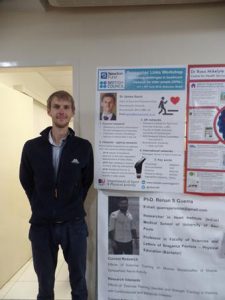





 Dr Holly Crossen-White has had a conference paper accepted for National Programmes Conference: Museums and Digital Memory Conference to be held at the British Museum in September. The paper will be presented with Dr Trudie Cole, Head of Access and Participation, The National Museum of the Royal Navy. Trudie and Holly have previously worked on several research projects related to the use of digital archives and this gives them opportunity to apply their findings within the context of collections held by the National Museum of the Royal Navy. Holly’s research interest in digital archives arose through her PhD which explored the hidden history of illicit drug taking during the early twentieth century. Holly has published on the ethical issues of undertaking research using digital archives and has been awarded Faculty Seedcorn Funding with her colleague Dr. Angela Turner-Wilson for some of this research work.
Dr Holly Crossen-White has had a conference paper accepted for National Programmes Conference: Museums and Digital Memory Conference to be held at the British Museum in September. The paper will be presented with Dr Trudie Cole, Head of Access and Participation, The National Museum of the Royal Navy. Trudie and Holly have previously worked on several research projects related to the use of digital archives and this gives them opportunity to apply their findings within the context of collections held by the National Museum of the Royal Navy. Holly’s research interest in digital archives arose through her PhD which explored the hidden history of illicit drug taking during the early twentieth century. Holly has published on the ethical issues of undertaking research using digital archives and has been awarded Faculty Seedcorn Funding with her colleague Dr. Angela Turner-Wilson for some of this research work.

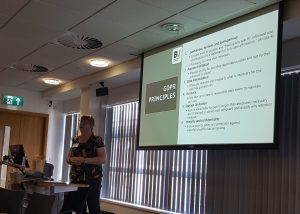

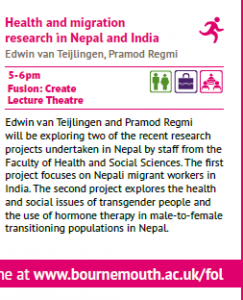
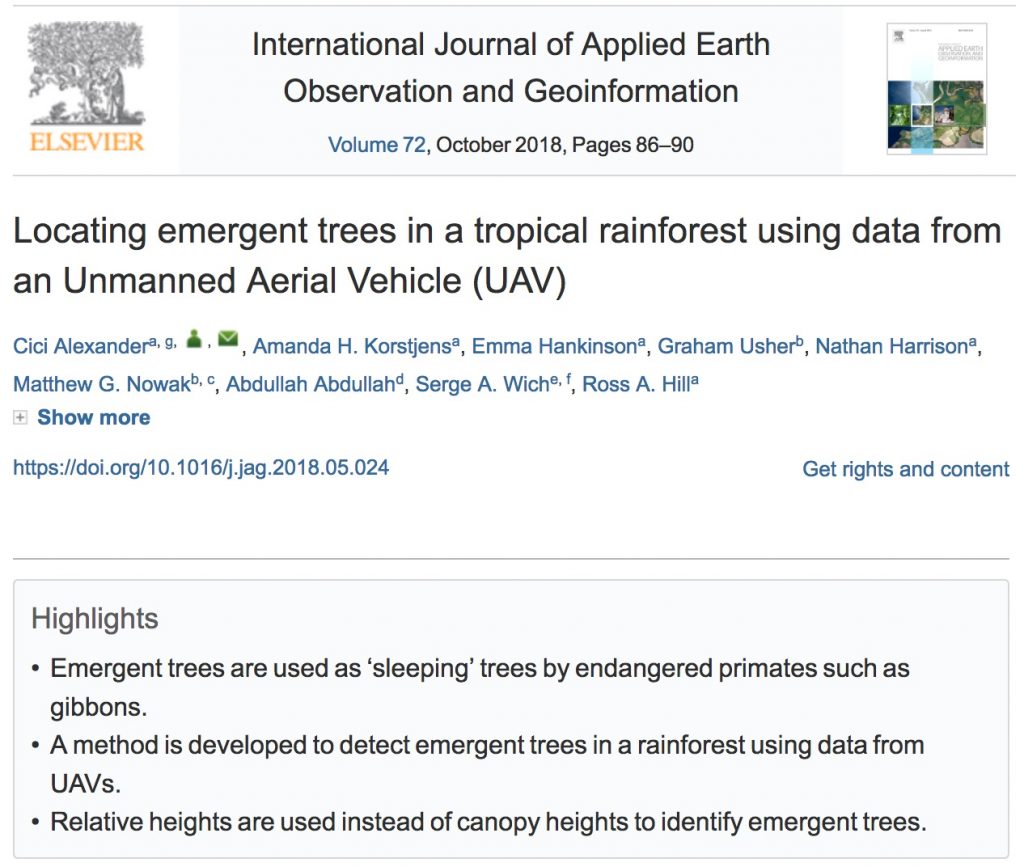


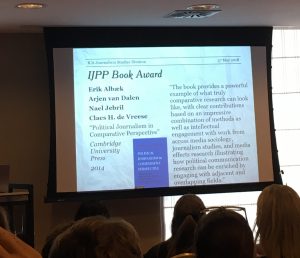 Dr Nael Jebril was recognised for his co-edited book entitled
Dr Nael Jebril was recognised for his co-edited book entitled 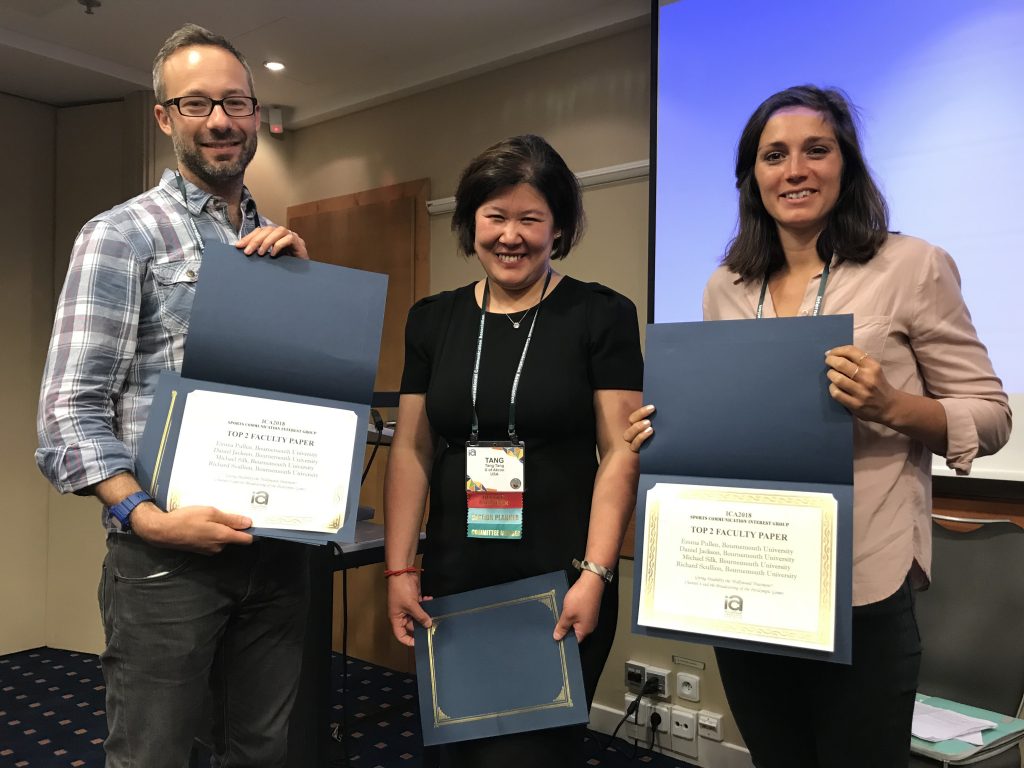











 From Sustainable Research to Sustainable Research Lives: Reflections from the SPROUT Network Event
From Sustainable Research to Sustainable Research Lives: Reflections from the SPROUT Network Event REF Code of Practice consultation is open!
REF Code of Practice consultation is open! BU Leads AI-Driven Work Package in EU Horizon SUSHEAS Project
BU Leads AI-Driven Work Package in EU Horizon SUSHEAS Project ECR Funding Open Call: Research Culture & Community Grant – Apply now
ECR Funding Open Call: Research Culture & Community Grant – Apply now ECR Funding Open Call: Research Culture & Community Grant – Application Deadline Friday 12 December
ECR Funding Open Call: Research Culture & Community Grant – Application Deadline Friday 12 December MSCA Postdoctoral Fellowships 2025 Call
MSCA Postdoctoral Fellowships 2025 Call ERC Advanced Grant 2025 Webinar
ERC Advanced Grant 2025 Webinar Update on UKRO services
Update on UKRO services European research project exploring use of ‘virtual twins’ to better manage metabolic associated fatty liver disease
European research project exploring use of ‘virtual twins’ to better manage metabolic associated fatty liver disease